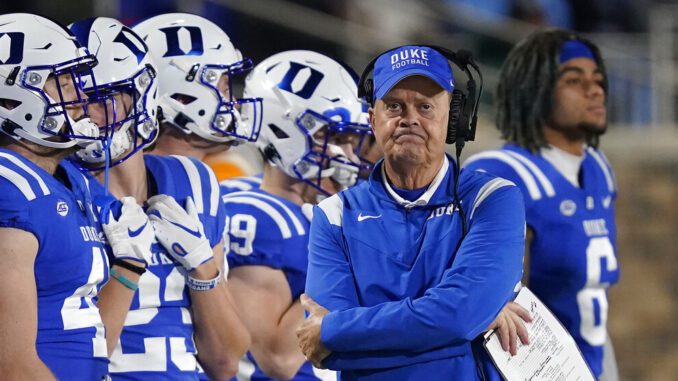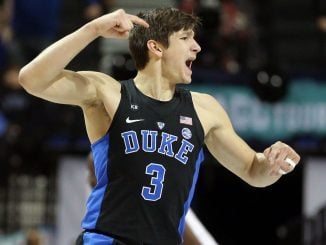
In the classic story “Flowers for Algernon,” a learning-disabled man undergoes an experimental procedure to improve his intelligence. The story tracks him as he gradually transforms into a genius, only to discover that the effects are temporary, and his gains slowly slip away as he reverts back to his previous level.
In the eight years before David Cutcliffe took over as Duke football coach, the Blue Devils had as many winless seasons — three — as ACC wins. Cutcliffe took over a program that was unquestionably the worst of any Power Five school, if not all of FBS. Duke had gone 10-82 over the previous eight years, including 3-61 in the ACC.
In his time at the helm, Cutcliffe has improved the facilities dramatically. He jokes that his early teams had trouble finishing drives because they didn’t have a practice field that was 100 yards long. They do now, one sprawling outdoor workout field and another indoor facility, all built under his watch, along with a face-lift for Wallace Wade Stadium.
The team improved dramatically on the field as well, ending nearly two-decade droughts for bowl appearances and wins over rival North Carolina.
Cutcliffe led Duke to six bowl games and doubled the program’s all-time total for bowl wins in a four-year span. He defeated the Tar Heels five times in a seven-year stretch, Duke’s best mark in the Victory Bell series in six decades.
Duke won the ACC Coastal Division in 2013 and was ranked in the final AP poll. The Blue Devils sent players to the NFL, including quarterback Daniel Jones, who was the sixth overall pick in the 2019 draft.
The team was recruiting NFL-caliber talent and winning in Durham, two things that had seemed impossible just a few years before. Cutcliffe had transformed Duke football from an afterthought at the school and a joke in the ACC to a force to be reckoned with on an annual basis.
Just like the main character in the story, the incredible gains were followed by an agonizing backslide.
Duke has lost its last 12 ACC games dating back to last season, and it hasn’t been competitive in most of them — the average score has been 49-18. That includes a pair of 48-0 losses, to Miami and Virginia, a 45-7 loss to Wake Forest and a 62-22 loss to Louisville last week. The last five Duke opponents have all scored at least 45 points and won by 25.
Cutcliffe has continued to be the coach that turned the program around — relentlessly positive and ready to work. He extols the virtues of practice and talks of running toward a problem, not from it. But the problems persist.
“You try not to repeat yourself,” he said when asked about the message to his team after the long string of losses. “Be genuine and be truthful. You can’t go in and just sing the same song. When you’re in there, you speak the truth of what you’ve seen.”
The hard truth is that this will be Duke’s third straight losing season, its sixth straight with a losing ACC record, and, if the Blue Devils don’t beat Miami this weekend, it will be Duke’s first winless ACC season since 2007, the year before Cutcliffe arrived.
It wasn’t long ago that it would have been unthinkable to consider Cutcliffe on a hot seat considering the depths from which he brought the program, but we’ve arrived at that point. According to reports in the national media, he may be considering retirement in the offseason.
Cutcliffe denies the reports.
“I don’t think about job security,” he said. “How can I do that and do justice to the players that I’m coaching right now? … Why would I even consider focusing on that?”
Cutcliffe certainly doesn’t sound like someone about to call it quits.
“How many people have we never heard of that were that close to doing something great and they stopped?” he said. “I mean, we don’t know. We know others, like Abraham Lincoln, that didn’t stop. … Those are the kinds of things that I think about. I don’t think about failure, I think about success and talk to them about success. Why would you do it any other way? I’ve coached in far too many football games to count, know or remember and certainly have never won them all. But I know this, if you stop competing to win, you’re not going to win. That has to be resolved. That’s inside of each one of us.”
If this is it for Cutcliffe, he leaves a complicated legacy — an impossible turnaround of the program, only to have it return to near the bottom. Like the story, the glimpse of what could have been makes the ending that much more painful.
“Don’t feel sorry for me,” the main character in “Flowers for Algernon” says. “I learned a lot of things that I never knew were in this world, and I’m grateful I saw it even for a little bit.”



